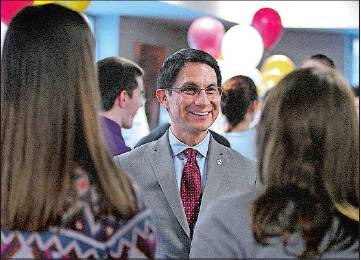RHODE ISLAND COLLEGE
Son of immigrant offi cially takes helm
By G. Wayne Miller Journal Staff Writer
PROVIDENCE — As he prepares for his formal installation Friday as Rhode Island College’s 10th president, Frank D. Sanchez looks to the new generations who will earn their degrees from the state’s oldest public institution of higher learning.
Many will be the first in their families to receive a college diploma. And Sanchez, 48, son of an immigrant, is establishing a special scholarship fund to help support their studies.
“Everyone can relate to this story, whether it’s themselves, their parents, or maybe their grandparents or their children,” Sanchez told The Journal. “Education is a powerful tool for change.”
His own family history provides ample evidence.
Announcement of the First-in-Family Fund scholarship program is one of several events in a celebration of Sanchez’ presidency that began Sunday with an alumni brunch. Sanchez will be formally installed Friday in a 1:30 p.m. ceremony at Roberts Hall Auditorium. A 6 p.m. inaugural ball at the Providence Performing Arts Center will cap the inaugural week.
Sanchez’s parents, Alice and Gil Sanchez, will be among the guests on Friday. They will have traveled to Rhode Island from Wyoming, where Sanchez and his two brothers and sister grew up. Alice was born in Mexico, and Gil’s grandparents came from there, too.
The Sanchezes set the educational example: Alice earned an associate’s degree before devoting her time to the family, while Gil earned two master’s degrees and became a coach and school principal in Cheyenne, where Frank and his siblings grew up. All four children have college degrees — with three, including Frank, holding advanced degrees.
His parents, Sanchez told The Journal, “were really the generation for our family that broke the cycle of poverty.”
And it is in their honor, Sanchez said, that he is establishing the First-in-Family Fund. Donations to the fund will provide scholarship assistance to freshmen who are first in their families to attend college, and who have graduated from a high school in the state with a grade point average of 3.5 or better.
RIC’s history is steeped in first-generational education.
“For decades, this institution has embraced the notion of serving a very diverse population of Rhode Islanders,” Sanchez said. “It was founded to support the state in providing education for new immigrants and to prepare exceptional teachers. To this day, we continue to serve a very diverse population of students.
“And it’s very much part of our sense of community here in welcoming students of different backgrounds, different incomes, many who are the first in their family to get a college education.”
According to RIC, more than 43 percent of RIC’s freshman class of 1,700 students identifiy as “first-in-family” and nearly 50 percent were recipients of Pell grants, awarded on the basis of financial need. Thirty percent of undergraduate and graduate students last fall identified as minority, with more than half of those listing themselves as Hispanic.
In a wide-ranging interview with The Journal, Sanchez described his “optimism” about RIC’s future and expressed confidence that the school, founded in 1854 as the Rhode Island State Normal School for the purpose of preparing teachers, will correct deficiencies in educator programs uncovered by the Rhode Island Department of Education.
In January, RIDE ordered RIC to write a corrective plan and gave the school a series of implementation deadlines Sanchez assumed office last summer, after serving as vice chancellor for student affairs at City University of New York, America’s largest public university. He succeeded Nancy Carriuolo, who resigned in May, more than a year before her three-year contract was to expire.
“We are quickly responding,” Sanchez said. “We’re working hand-in-hand with the commissioner,” Ken Wagner.
“We’re working with RIC to ensure its education graduates are ready to succeed in Rhode Island schools and we are on track to making that happen,” RIDE spokeswoman Christine Lopes Metcalfe told The Journal. “We look forward to continuing to work with President Sanchez and his team and are confident that they share our commitment to that goal.”
To assist with compliance and help with steering the college to the future, RIC this week created a President’s Commission on Inclusive Excellence. Among its 24 members are educators, a banker, an artist, a police officer, and community activists
Sanchez will beinstalled with the support of the heads of Rhode Island’s two other public colleges, the Community College of Rhode Island’s Meghan Hughes and URI’s David M. Dooley, with whom the RIC president has been building ties.
“I recently hosted a dinner at my home with the two presidents to really start a much more open conversation about what our needs are as public institutions,” Sanchez said “How we build synergies off each other and complement each other.”
Hughes said Sanchez has demonstrated a “passion” for education throughout his career in higher education “by focusing on college accessibility for low-income and first generation students, degree completion, and the creation of pathways that promote student persistence. From the moment he arrived, Dr. Sanchez has been an exceptional partner to CCRI. I’m excited to continue our collaboration as we move forward in serving all Rhode Island students.”
“Rhode Island College and indeed the entire state are extremely fortunate to have Dr. Frank Sanchez serving as the 10th president of the college,” said Dooley. “President Sanchez comes to Rhode Island with an impressive record of service to the under-served and marginalized, and he is a national leader on student success initiatives.”
Inaugural week activities, expected to cost about $66,000, are being financed through private donations and fundraising, not taxpayer dollars. RIC expects to raise some $200,000, with the $134,000 surplus to be added to the First-in-Family Fund scholarship program.
Learn about the First-in-Family Fund at www.ric.edu/ inauguration/first-in-family-fund.php
